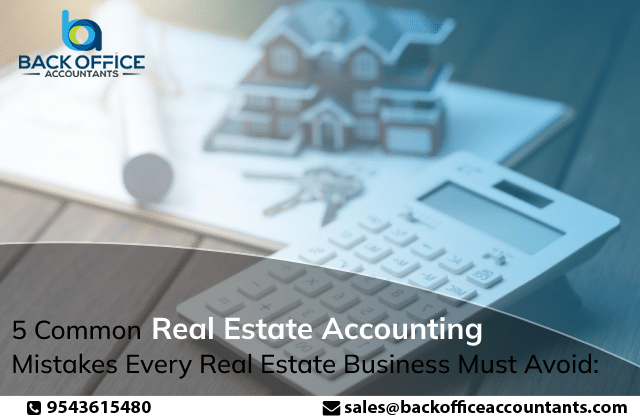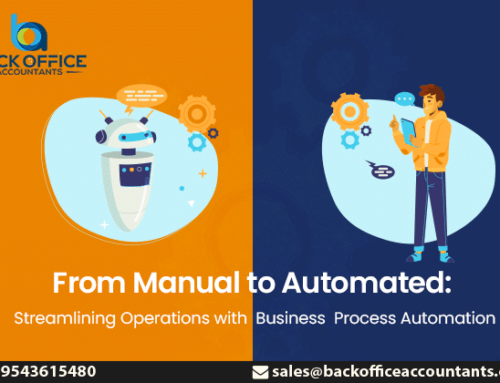Managing the bookkeeping and accounting doesn’t necessarily guarantee the results, accomplishing them accurately and efficiently does. For example, almost all real estate business that approaches Back Office Accountants have their real estate bookkeeping and accounting process fall short of bringing expected results.
This underperformance in real estate bookkeeping and accounting can hurt a real estate business in multiple ways over time. Tax problems at the year-end, compliance issues, lack of proper track of cash flow, financial oversights, penalties, and increased fraudulent transactions – ineffective bookkeeping and accounting can spell a financial blunder for a real estate business. Every real estate business’s bookkeeping and accounting functions at least once in a while run into one of these accounting problems due to the adoption of ineffective accounting practices.
Being one the best remote accounting firm for real estate accounting and accounts payable services, our accounting experts have corrected plenty of these mistakes. However, the first step in optimizing the process is identifying the mistakes followed by adopting best practices. So in this blog here we first explain the common mistakes performed by real estate accounting departments and in the next blog we provide you with a list of best practices that can improve your current accounting process. Read on:
5 Common Real Estate Accounting Mistakes Every Real Estate Business Must Avoid:
1. Data Classification Inaccuracies: Incorrect or ambiguous data classification is the fastest and most effective to undo all the bookkeeping and accounting efforts when it comes to real estate accounting. With so many transactions to and from multiple streams, it becomes crucial to have proper documentation with accurate labels when it comes to Accounts Receivable and Accounts Payable. Especial businesses due to so many moving parts, cop Accounts Payable problems which is why it is always advisable to seek help from an accounting firm with expertise in real estate accounts payable.
2. Separate Tracking of Commissions: Real estate businesses today tend to track their commissions separately and this usually results in double work increasing complexity and inducing errors for the accounting side. Tracking these commissions separately also reduces transparency and creates reductant reports. By taking a unified approach in tracking and merging these commissions, a business can reduce complexity, improve transparency and simplify the accounting side of the sales and commissions. In case you are finding it difficult to track and integrate them, businesses can have a look at a variety of automation tools that makes this simple and seamless.
3. Mixing personal and business accounts: In most cases real estate businesses have a lax structure and not so defined rule of control in accounting which is why they merge personal and business accounts that eventually create a slew of accounting problems.
This is the most common accounting mistake that we often see in the real estate business and this makes it difficult when it comes to the evaluation of profits, expenses and other important parameters. This lack of strict classification leads to an incorrect picture of the financial situation and inaccurate analysis leading to problems in tax payments, analysis, forecasting and more.
4. Inaccurate classification for expenses: If a real estate business is unable to extract tax benefit then more often than not the problems stems from an accurate classification of expenses. With versatile payment and receivable streams, it is no wonder businesses without expert help y their side will find it hard to classify expenses accurately. This inaccurate classification will ultimately lead to a misleading financial picture and statistics – a bedrock for accurate and efficient real estate accounting. Especially in the real estate business where the competition is high, businesses cannot afford mistakes these mistakes.
5. Poor financial record maintenance and management: Cleanliness and veracity of financial records play a huge role in real estate accounting be it to track the cash flow, file tax returns, ensure compliance or even secure loan. Maintaining clean financial records is also the best thing an accounting team can do to ensure the scalability of bookkeeping and accounting.
However, most accounting departments either due to lack of personnel or expertise fall short of maintaining adequate records which a huge mistake is. If you are a real estate firm facing record maintenance problems then it is recommended to hire the best real estate accounting firm to help with record maintenance and bookkeeping.
How Back Office Accountants can help?
As a remote accounting firm, Back Office Accountants has an excellent track record in optimizing real estate accounting for leading real estate businesses in the US. Our expert real estate accountants are equipped with advanced tools and expertise in the real estate business that can not only improve the financial situation but also find new growth opportunities effortlessly. With dedicated real estate accounting a real estate accounts payable services, Back Office Accountants can optimize your accounting process for better growth. You can find us here: https://www.backofficeaccountants.com/







